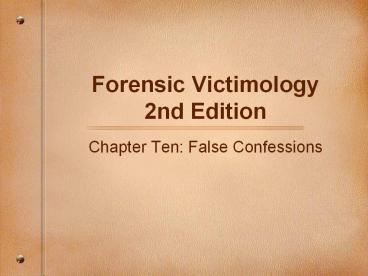Forensic Victimology 2nd Edition - PowerPoint PPT Presentation
1 / 8
Title:
Forensic Victimology 2nd Edition
Description:
Forensic Victimology 2nd Edition Chapter Ten: False Confessions False Confessions A false confession is an involuntary statement of guilt made under duress, or as ... – PowerPoint PPT presentation
Number of Views:134
Avg rating:3.0/5.0
Title: Forensic Victimology 2nd Edition
1
Forensic Victimology 2nd Edition
- Chapter Ten False Confessions
2
False Confessions
- A false confession is an involuntary statement of
guilt made under duress, or as the result of
coercion. - False confessions are far from rare.
- Those most at risk for a false confession share
one characteristic they are naive to police
procedure. - This can be due to chronological age, mental age
or life experience.
3
False Confessions
- Anyone can be induced to give a false confession
under the right circumstances. - One of the most obvious ways to document, if not
prevent, a false confession is to videotape all
suspect interrogations in their entirety.
4
Confession Law
- Confessions are expected to be free of
compulsion or inducement. - The use in a state criminal trial of a
defendants confession obtained by coercion is
forbidden by the Fourteenth Amendment. Brown v.
Mississippi (1936) held that convicted resulting
solely from confessions obtained through
brutality and violence violated due process. - However, psychological coercion was not deemed
unconstitutional. - The legal onus was on the defendant to be able to
provide the confession was extracted through
violence.
5
Confession Law
- In 1966 the Miranda Warning was introduced.
- This required police to advise a subject in
police custody that they had a right to an
attorney and that they did not have to answer
questions and, further, that they had the right
not to incriminate themselves.
6
Types of False Confessions
- Voluntary false confession
- A confession to a crime given by an individual
who either knows they did not commit the crime,
but nonetheless has made a decision to confess,
or through no pressure from police has come to
believe they committed the crime they are
confessing to. - Coerced-Compliant confession
- A confession to a crime given by an individual
who knows he or she is innocent, but due to
conditions of the interrogation, says what they
believe is necessary to placate the interrogator
and end the situation.
7
Types of False Confessions
- Coerced-Internalized confession
- A confession to a crime given by an individual
who comes to actually believe they may have
committed the crime.
8
Interviewing and Interrogation
- Many styles of questioning are either directly
from, or based to a significant degree, on the
Reid technique, a nine-step technique of
interviewing and interrogation that is outlined
in the fifth edition of Criminal Interrogations
and Confessions (Inbau, etal, 2013). - The authors of the Reid Technique purport to
present a system of interrogations that would
minimize false confessions, when it is designed
only to get confessions. - This chapter identifies several issues with this
technique.































